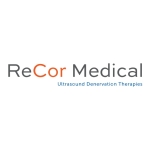ReCor Medical Reports Latest Data from Landmark Renal Denervation Clinical Trials at TCT Annual Meeting

RADIANCE-HTN TRIO and SOLO trial updates demonstrate the durability of blood pressure lowering effects of the Paradise Ultrasound Renal Denervation System in a broad spectrum of patients with hypertension.
PALO ALTO, Calif.–(BUSINESS WIRE)–Otsuka Medical Devices Co., Ltd. (“Otsuka Medical Devices”), a fully owned subsidiary of Otsuka Holdings Co., Ltd., and its subsidiary ReCor Medical, Inc. (“ReCor”) today announced the presentation of 6-month results from the RADIANCE-HTN TRIO (“TRIO”) study, a randomized sham-controlled trial in patients with resistant hypertension. Reported in a late-breaking clinical trial session at the Transcatheter Cardiovascular Therapeutics (TCT) annual meeting, patients treated with the Paradise™ Ultrasound Renal Denervation System maintained its blood pressure (BP) lowering effect over six months. In addition, data from the RADIANCE-HTN SOLO (“SOLO”) trial were presented in a poster session, demonstrating a durable BP lowering effect over 24 months for those patients treated with the Paradise System.
The seminal TRIO study evaluated the efficacy and safety of the Paradise System in patients with resistant hypertension who remained uncontrolled following treatment with a single pill containing 3 standardized antihypertensive medications. The 6-month follow-up data showed that the treatment was durable in patients who originally had an 8.0 mmHg median reduction in daytime ambulatory systolic BP at the 2-month primary endpoint. After primary endpoint collection, the second phase of the trial consisted of a sequential addition of standardized antihypertensive medications in both groups to lower BP to clinically recommended targets. At 6 months, the renal denervation group achieved lower home systolic BP and similar ambulatory systolic BP with fewer added medications, including less use of aldosterone antagonists, the recommended 4th line antihypertensive medication for resistant hypertension. There were no differences in safety outcomes between the two groups.
The SOLO study measured the BP lowering effect of the Paradise System in patients with mild to moderate hypertension, taking no medications at study randomization. The study met its primary endpoint at two months when patients were off medications, and showed a persistent BP lowering effect at 6 and 12 months with fewer antihypertensive medications. The results at 24 months in the SOLO trial confirm the persistence of a clinically relevant BP reduction in the patients treated with the Paradise System. The treated arm achieved a substantial 17.1 mmHg mean reduction in office-measured systolic BP from baseline at 24 months, following introduction of an average of 1.2 oral antihypertensive medications. No adverse safety signals were observed.
“The RADIANCE-HTN TRIO study demonstrates the efficacy and 6-month safety outcomes of the Paradise Ultrasound Renal Denervation System in patients with resistant hypertension. After renal denervation, further reductions in blood pressure were achieved with fewer added medications, particularly aldosterone antagonists,” said co-principal investigator Ajay J. Kirtane, MD, SM, Professor of Medicine at Columbia University Vagelos College of Physicians and Surgeons. “These data lend further support for the Paradise System as a potential treatment option for patients with resistant hypertension.”
“Durability of the blood pressure lowering effect of renal denervation has been a focal point for many in the field of hypertension. The latest data from the RADIANCE-HTN SOLO trial show that the Paradise Ultrasound Renal Denervation System’s treatment effect is still present at 24 months with no risk to patient safety, consistent with other long-term observational data,” said co-principal investigator Professor Michel Azizi, MD, PhD, Professor of Medicine at Université de Paris, Head of the ESH Hypertension Excellence Center, Hôpital Européen Georges Pompidou, Paris, France.
The Paradise System bears the CE mark in Europe and is an investigational device in the United States. The Paradise System is currently under investigation in the United States and Europe in the on-going FDA IDE pivotal study (RADIANCE-II) in patients with uncontrolled hypertension, with anticipated enrollment completion in 2022.
Hypertension is the leading contributor to disease burden worldwide, leading to increased cardiovascular morbidity and mortality, poorer quality of life, and increased cost to health systems.
About ReCor Medical, Inc.
ReCor Medical, headquartered in Palo Alto, CA, is a medical technology company focused on transforming the management of hypertension, the leading cardiovascular risk factor in the world. ReCor has pioneered the minimally invasive use of ultrasound in renal denervation, and developed the Paradise System, to treat patients with hypertension. The Paradise System is an investigational device in the United States. It is approved for sales in the EU and bears a CE mark. The company has completed two randomized, sham-controlled studies of the Paradise System in patients with both moderate hypertension and those resistant to standard medical therapies. ReCor is currently conducting its FDA IDE pivotal study, RADIANCE-II, and pending successful completion will submit for PMA approval.
ReCor Medical is a wholly owned subsidiary of Otsuka Medical Devices Co., Ltd.
About Otsuka Medical Devices Co., Ltd.
Otsuka Medical Devices focuses on the global development and commercialization of endovascular devices that provide new therapeutic options in areas where patient needs cannot be met through pharmaceutical or other conventional treatment. Otsuka Medical Devices Co., Ltd. is a subsidiary of Otsuka Holdings Co., Ltd. (www.otsuka.com/en), a leading global healthcare group listed on the Tokyo Stock Exchange (JP 4578).
https://www.omd.otsuka.com/en/
Contacts
Annika Parrish
Health+Commerce
annika@healthandcommerce.com

